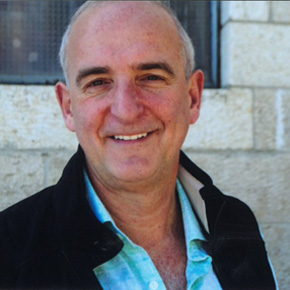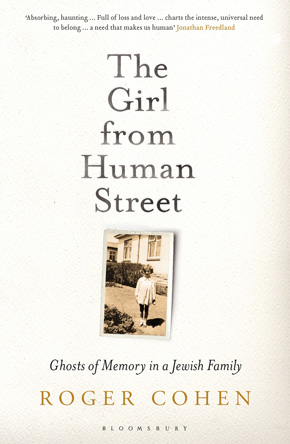Never forget to remember
by Mika Provata-CarloneRoger Cohen’s The Girl from Human Street: Ghosts of Memory in a Jewish Family is a truly haunting, vibrant, unusual and staunchly poignant gentle book. It is in fact not one, but many books: a lingering, evocative memoir, a gripping narrative, a shrewd socioeconomic history of South Africa, Britain, Israel, the US and Eastern Europe, a piercing philosophical analysis of the ethics of memory, of belonging to a story. It is quite unflinchingly an enquiry into the moral prerequisites of being human.
It is also a kind of inventory of the senses and the emotions, a book about objects, homes and landscapes, as much as it is about people and history or their own privately public, communally personal, [hi]stories.
There are many vital questions driving the narrative: the value and definition of identity (self-identity, national identity, historical and religious identity), the meaning of rootedness, and the concepts of past, present and future. Also the implications of faith, its necessity, the conditions that make it possible, impossible or pervert it. This is a book that dares ask the question as to whether there are people, and by extension peoples, ineluctably distinct from one another, or whether there is one essentially single and singular humanity torn apart, desperately – often catastrophically and blindly – seeking reunion. It is about “perpetrators, bystanders and resisters”. The Girl from Human Street is also the story of one young girl, Roger Cohen’s mother, who grew up on Human Street, Johannesburg, only to struggle with the world’s and her own likely or unlikely humanity. The intimate story of her depression, of her dark labyrinthine passage through experience, is the warp and weft of Cohen’s book.
Roger Cohen is a brilliant, daring, perceptive and vociferous journalist, reporter and columnist. He has been present at and a witness to almost every recent bloody conflict around the globe, querying truth and falsehood, probing sides, centres and displaced grounds of resolution. Yet here the fact-finder becomes a ‘mere’ storyteller. And this is perhaps the most engrossing feature of this book: to the question, repeated, resounding and unquietened of ‘what price life?’ Roger Cohen presents us with just one answer: the price of life is memory. And memory is stories.
Stories rescue humanity, Cohen shows us, both from oblivion and dehumanisation. Facts often divorce man from his own mankind.”
Yet whose memory is it after all? Whose story is the untold untellable story that bursts forth on every page of this unquiet gentle book? Is there such a thing as singular or private memory? Memory is shared, has threads, loose ends, split seams and bald patches, so who owns it? Who yields it and defines it? These are Roger Cohen’s questions.
In trying to answer them, the storytelling witness of facts comes upon an age-old intellectual crossroads, where he must make as dire a moral choice as Hercules’ own: what is more important, people’s stories or recorded facts? The Girl from Human Street suggests a much forgotten truth, a very substantial fact: stories, the story of a person, a people or a country most often reveal hidden facts. Whereas facts, cerebrally venerated, deferentially revered, rarely reveal real people.
Stories rescue humanity, Cohen shows us, both from oblivion and dehumanisation. Facts often divorce man from his own mankind. “The barrier of fact” is what Cohen’s uncle Bert called it: “The bigger you grow, the bigger the barrier. Beyond the barrier lies the land of colourful imagination. When you are young, you can go there yourself. When you are older, someone must describe it for you.”
‘Thank God for the blacks,’ says a family friend, ‘If not for them, it would be us.’ There are horrific, heinous echoes in such observations, in such statements, which Roger Cohen does not ignore.”
Cohen’s facts are indelibly historical: the periplous of a Jewish family leaving Lithuania during the late 19th century pogroms and arriving, in its majority, first of all in South Africa. The transplant from North to South is not simply a geographical reversal of hemispheres; it is above all a geopolitical and existential reversal of social and human identity. “Jews for once were on the right side of things: they were white. To be white was to be invested with automatic privilege. A large buffer against persecution existed: the blacks. Having a plentiful underclass of pariahs constituted protection for a people, the Jews, who were used to playing that role in Europe. Whatever qualms the blacks’ troubles might stir – and they did, for they held up a mirror – were weighed against the inversion of roles that afforded Jews newly ushered from the shtetl a fragile sense of security.”
“Thank God for the blacks,” says a family friend, “If not for them, it would be us.” There are horrific, heinous echoes in such observations, in such statements, which Roger Cohen does not ignore:
“Jews often ask how the Holocaust was possible […] South Africa is instructive in this regard. […] The human traits that buttress a violent system of racist oppression – fear, envy, tribalism, resentment, conformism, opportunism, acquisitiveness – are universal and enduring. Inject the virus of hatred, with violence if need be, and it will find tissue on which to propagate.”
The parallel, of course, is only partial, sketchy at best, for all its terrifying poignancy. The legal counsellors of Mandela were famously Jewish. And the Jews in South Africa were certainly not white: anti-Semitism, whether whispered or hissed, was rampant, initially incomprehensible to the young Roger, then fully, historically, sociologically attested by the grown man.
Is history relative, one might ask? Many have wished to argue, for their own greater or more narrowly defined interest, that it is. But Cohen shows that history is not relative. It is fundamentally and crucially relational, and above all it is relevant. South Africa becomes a subject for the most sincere scrutiny, an investigation full of personal and more general pain, but it emerges, outstandingly, as a critical catalyst, a prism through which to multiply the image viewed, and sharpen its quality – clarify both the visual and the situational resolution. South Africa and Apartheid become the third term elucidating and humanising burning questions, valid, sacred ethics.
With the help of Holocaust survivor Rabbi André Ungar, who confronted South Africa of every hew with its own festered image, Cohen has the courage to ask difficult, embarrassing questions – or rather, to quote Helen Suzman, the South African MP accused of embarrassing South Africa with similar questions, “it is not the questions that are embarrassing, but the answers.” In so doing, the reader feels the stormy presence of another ‘embarrassing’ questioner, Hannah Arendt, also amongst Cohen’s quoted companions. South Africa and the Holocaust, the troubling memories of Cohen’s uncle Bert who fought in Italy with the South African Armoured Divisions but did not have to escape, at least nominally, from Nazi Germany, and who was left ashamed and horrified by his own revulsion at the sight of a Jewish refugee camp, can only lead to Israel and Palestine, by way of Britain and the US. If Britain was the place where Jewishness was cautiously and almost constitutionally whispered, “wasn’t America one continent-sized exercise in amnesia? The future mattered; the past was dangerous, fraught with shame.”
Israel represents the possibility for the future to matter because of its past. And in his account, analysis, appreciation and admonition of Israel, Cohen excels in intellectual rigour, ethical purity and human kindness. This is the section of his story which truly rumbles with a sense of vital meaning; it is also the section which for Cohen provides him with a true understanding of his identity – ethical, authorial, national, religious, for all that he claims to be an atheist. In beautifully chosen passages from the Torah and Ecclesiastes, from Rabbinic writings, we see a way together and beyond: “what is hateful to yourself,” says Rabbi Hillel, “do not do to your fellow man. That is the whole Torah; the rest is just commentary. Go and study it.” And as the Mosaic Book says repeatedly and tirelessly, “You were exiled in order to know what it feels like to be an exile.” Towards the end of his story, Cohen reminds us, as he lists the full torment of Jewish suffering, that “Israel has undermined its Zionist founders’ commitment to a democratic state governed by laws.” This is a voice proud of its timbre, alert to its pitch, anxious for the necessary purity and harmony that alone allows being.
There is an Inca-like perception of the inter-permeability of time and of the vital interaction between past, present and future in The Girl from Human Street, between the dead, the living and those still to be born. This book is the story of many stories, and especially a decentralised history, transcending conventional European boundaries of narrative and global significance. In this sense, Cohen has written about the so far unwritten, untold, unknown, as well as about the unwritable, untellable and inconceivable. If we could all tell stories the way Roger Cohen has done here, elegiacally as well as with a sense of duty, respect, daring, perfectly sincere clarity and above all deep humanity, if we could listen to the stories of others, to the story of The Other, then the human story, human history itself, might perhaps still find hope at the bottom of the Pandora’s jar that seems to be our contemporary world.
 Roger Cohen is a columnist for the New York Times. As foreign editor, he oversaw Pulitzer Prize-winning coverage in the aftermath of 9/11. He worked as a foreign correspondent for many years, beginning at Reuters. He has won numerous accolades and was honoured with the Lifetime Achievement award at the International Media Awards in 2012. Raised in South Africa and London, a naturalised American, he lives in London and New York. The Girl from Human Street is published in hardback and eBook by Bloomsbury. Read more.
Roger Cohen is a columnist for the New York Times. As foreign editor, he oversaw Pulitzer Prize-winning coverage in the aftermath of 9/11. He worked as a foreign correspondent for many years, beginning at Reuters. He has won numerous accolades and was honoured with the Lifetime Achievement award at the International Media Awards in 2012. Raised in South Africa and London, a naturalised American, he lives in London and New York. The Girl from Human Street is published in hardback and eBook by Bloomsbury. Read more.
nytimes.com/cohen
@NYTimesCohen
Mika Provata-Carlone is an independent scholar, translator, editor and illustrator, and a contributing editor to Bookanista. She has a doctorate from Princeton University and lives and works in London.


